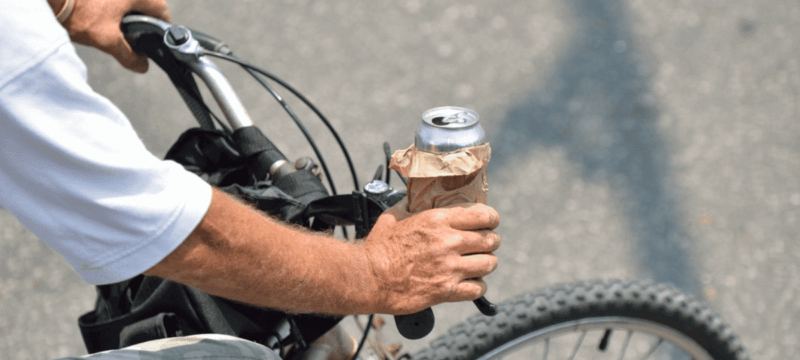Introduction
Cruising on a bicycle, wind in your hair is refreshing and environmentally conscious. Yet, much like any transportation mode, regulations exist to ensure safety and accountability. Among the inquiries that often arise is the possibility of receiving a DUI (Driving Under the Influence) while pedaling a bicycle. This article will explore the intricacies, legal aspects, and implications surrounding this intriguing topic.

Understanding DUI Laws
Grasping the DUI Concept
DUI laws typically encompass individuals operating motor vehicles under the influence of alcohol or drugs. These regulations exhibit variability across jurisdictions, often hinging on specific blood alcohol concentration (BAC) thresholds. However, the regulatory panorama can seem less distinct when the focus shifts to cycling.
The Bicycle Exception
Navigating the Nexus of Bicycles and DUI Laws
In numerous regions, DUI laws conspicuously zero in on motor vehicles, inadvertently neglecting bicycles. This divergence arises due to the stark differences in mechanics, velocities, and potential consequences between motor vehicles and bicycles. Hence, certain jurisdictions introduce a “bicycle exception,” sparing cyclists from DUI accusations.
Potential Legal Consequences
Potential Ramifications for Pedaling Under the Influence
Though particular territories may not explicitly address cycling under the influence within their DUI statutes, legal repercussions might still ensue. Cyclists could face charges encompassing public intoxication, recklessness on the road, or similar infractions, contingent on local laws.
Grey Areas and Challenges
Maneuvering the Ambiguities in Law
Unambiguous regulations concerning cycling under the influence create an arena of ambiguity and hurdles. Defining a safe BAC threshold for cyclists or executing sobriety tests in a cycling context introduces complexities lawmakers must grapple with.
Safety Concerns
Prioritizing Prudent Pedaling
Regardless of legal semantics, the paramount concern unequivocally revolves around safety. Pedaling under the influence can compromise a cyclist’s discernment, coordination, and reactionary capacity, amplifying the rider’s peril and jeopardizing pedestrians and motorists sharing the thoroughfare.
Preventing Legal Predicaments
Stratagems to Sidestep Situations
Foresight is Foremost: If indulgence is on the horizon, contemplating leaving your bicycle at home and opting for alternative conveyance might be judicious.
Designated Chaperones: Analogous to vehicular travel, enlisting a sober companion for your cycling journey can augment safety levels considerably.
Cognizance of Local Jurisprudence: Familiarizing yourself with localized laws about cycling under the influence is sagacious.
Conclusion
Ultimately, the prospect of incurring a DUI on a bicycle pivots predominantly on the legislative framework within your jurisdiction. While some locales extend tailored leniency, the overarching emphasis should unequivocally be on safety. Responsible cycling not only averts legal entanglements but also bolsters an environment of secure and gratifying travel for all road users. Should uncertainties about your local statutes persist, seeking legal counsel or sidestepping inebriated biking entirely stands as prudent counsel.
READ MORE:
Frequently Asked Questions:
Q1: Can you get a DUI while riding a bicycle?
A1: Yes, indeed. Surprisingly, you can receive a DUI while pedaling a bicycle. However, the specifics vary significantly depending on your location. Different regions have different laws; some explicitly include bikes under DUI regulations, while others might leave room for more ambiguous interpretations.
Q2: Do DUI laws for bicycles differ from those for motor vehicles?
A2: Absolutely. DUI laws for bicycles and motor vehicles are distinct. Traditional DUI laws focus on motor vehicles due to their higher speeds and greater potential for causing serious accidents. With their slower speeds and different dynamics, bikes often have unique rules and exceptions.
Q3: Are there jurisdictions where cyclists are exempt from DUI charges?
A3: Interestingly, yes. In certain places, “bicycle exceptions” exist within DUI laws. These exceptions spare cyclists from facing DUI charges. This recognition stems from the understanding that bicycles operate differently from motor vehicles, carrying varied risks and dynamics.
Q4: What are the potential legal consequences of biking under the influence?
A4: Even in areas without explicit bicycle DUI laws, biking under the influence can still lead to legal complications. Depending on specific local regulations, you might face charges like public intoxication or reckless cycling.
Q5: How are sobriety tests conducted for cyclists?
A5: Imagine performing a typical sobriety test while on a bicycle. It’s quite a challenge due to the unique dynamics of cycling. Some jurisdictions have developed adapted tests for cyclists, while others might resort to the more common field sobriety tests used for drivers.
Q6: Does biking under the influence affect safety?
A6: Absolutely. Pedaling under the influence can significantly impair your ability to make sound judgments, coordinate your movements, and react promptly. This doesn’t just endanger you – it also puts pedestrians and drivers who share the road with you at risk.
Q7: How can I avoid legal issues related to biking under the influence?
A7: Great thinking! To avoid legal entanglements, consider leaving your bike behind if you plan on indulging. Alternatively, bring along a sober friend who can ride alongside you. And, of course, familiarize yourself with the local laws in your area – it’s like having a roadmap for a safer journey.
Q8: Are there any BAC limits for cyclists?
A8: The rules regarding Blood Alcohol Concentration (BAC) can be somewhat nuanced for cyclists. While some places apply the same BAC limits as those for motor vehicles, others might adjust the limits due to the differing nature of cycling and the potential risks involved.
Q9: What should I do if I’m unsure about the laws in my area?
A9: When in doubt, consult a legal expert. If you are still determining the laws concerning cycling under the influence in your area, seeking advice from a lawyer specializing in traffic or DUI laws is prudent. A bit of guidance can go a long way in keeping you well-informed and out of trouble.
Q10: Is responsible biking essential even if no specific laws exist in my area?
A10: Absolutely. Responsible biking should always be a top priority, regardless of the legal intricacies. Regardless of the legal framework, prioritizing safety keeps you on the right side of the law and contributes to a safer environment for everyone who shares the roads. It’s a win-win situation for all.

